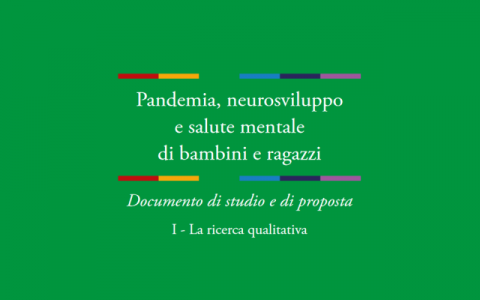
During the pandemic, there was an increase in the number of neuropsychological disorders among children and young people. This was a real "mental health emergency", and could be measured by the increase in requests for help in this area. This is what emerged from the results of the first phase of research carried out by the Autorità garante per l’infanzia e l’adolescenza (AGIA) in collaboration with the Istituto superiore di sanità (ISS), and reported in the publication "Pandemia, neurosviluppo e salute mentale di bambini e ragazzi. (The pandemic, neural development and the mental health of children and young people.)"
The survey, which ran for three years and was divided into three macro-phases, aimed to understand, quantify, and qualify the extent and depth of the phenomenon, to help to identify effective strategies to support minors and identify best practices to help children and young people in vulnerable or at-risk situations.
The first phase involved over 90 experts including child neuropsychiatrists, paediatricians, social workers, psychologists, educators, and teachers, who were interviewed in focus groups and individually.
The professionals interviewed reported changes in sleep-wake rhythms, eating disorders, suicidal thoughts, attempted suicide and actual suicides, self-harm, and social withdrawal. In the educational field, learning, attention, and language disorders, behavioural disorders, and cognitive and emotional disturbance, as well as fear of contagion, frustration, and uncertainty regarding the future were also found. In addition, there has been an increase in requests for assistance following the use of psychoactive substances, cannabinoids, and alcohol, while unaccompanied migrant minors have experienced difficulties in managing the isolation and quarantine in reception facilities.
The sudden increase in requests for help is explained on the Garante per l’infanzia (Guarantor for Children) website, "...in many cases women are inadequately paid and the lack of help received revealed deficiencies and structural delays even prior to the coronavirus crisis. Children, young people, and families have often been forced to turn to private individuals for help, resulting in significant and difficult-to-sustain financial commitments, which have increased inequality. At the same time, the lockdown revealed the potential of telemedicine in tackling mental health issues, but it is necessary to invest without delay in operator training and in the specific technologies required to assist children and teenagers".
One chapter of the publication is dedicated to recommendations on neural development, mental health, and the psychological well-being of children and young people made by the Authority to Parliament, the government, the regions, municipalities, educational institutions, and social and third sector promotional bodies.
The booklet is available on the AGIA website, in the "Pubblicazioni (Publications)" section.
More material and updates can be found on this site in the section on "Disturbi psichici" e "Bambini, ragazzi e Covid-19" (Mental disorders and Children and covid-19 pandemic)", under the "Temi (Topics)" menu.

